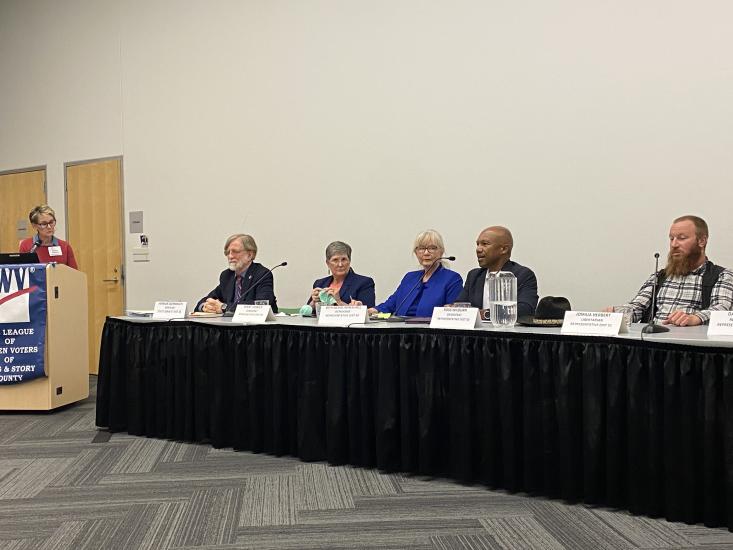State legislators address gun control and reproductive rights at meet and greet
Penny Vossler, Democratic representative for district 48, can be seen knitting passively while at the meet and greet.
Herman Quirmbach, Democratic state Senator for District 25, said the two victims of the Cornerstone Church shooting would have been protected by stricter gun legislation during a panel hosted by the Ames and Story County League of Women Voters.
Quirmbach said he is in favor of the right to bear arms but in a well-regulated manner as outlined in the U.S. Constitution, adding that he advocates for common sense gun control.
“I think it’s common sense that you don’t let an 18-year-old to a teenager buy an AK-47,” Quirmbach said. “I think it’s common sense that you have some legal procedure when someone is having a psychological crisis, with due process, to temporarily take away their firearms, and if we’d had that kind of law here in Iowa and had it been invoked, the two women who were murdered down at Cornerstone Church earlier at the beginning of this summer might still be alive. That’s common sense to me.”
Quirmbach said the passing of an amendment set to be on ballots this November, which may constitutionally protect the right to bear arms under state law and will require any legislation regarding firearms to be under strict scrutiny, will impede the passing of meaningful gun control legislation.
Beth Wessel-Kroeschell, a Democratic representative for District 49, said the strict scrutiny requirement would make it nearly impossible for common-sense gun legislation to be passed in the legislature.
“I believe in safe and responsible gun ownership,” said Ross Wilburn, a representative for District 50 and chair for the Iowa Democratic Party. “Therefore, I’m against the constitutional amendment because it doesn’t allow for that.”
Joshua Herbert, a Libertarian representative for District 51, said he does not favor gun regulations in any way, adding that he helped author the amendment.
Reproductive Rights
Penny Vossler, Democratic representative for District 48 said when she was a young bride attempting for her first child, she experienced an ectopic pregnancy, a pregnancy where a fertilized egg implants itself outside of the uterus.
“I didn’t know I was pregnant; I didn’t know that at the time,” Vossler said. “The pain dropped me to my knees where I could not reach the wall phone to call for help. I did not know what was wrong with me.”
Vossler said once the pain subsided and she was able to call for help, she was rushed to the emergency room, where the fertilized egg was removed.
“The procedure to remove that pregnancy they get stuck in your fallopian tube is considered an abortion, and that would be illegal under a lot of different state laws. Women will die in states that are very restrictive on their abortion,” Vossler said. “Doctors are admitting these women to the hospital and waiting till it ruptures and then trying to save their life before they bleed out.”
Herbert said the government should not tell people what they can or cannot do with their own bodies.
“I am firmly pro-choice,” Quirmbach said. “I think we ought to enact statutorily the provisions of Roe v. Wade, allowing a woman to make that decision in consultation with her doctor but not reporting to the governor or anybody else in the legislature.”
Water Quality
Vossler said she has seen an increased volume of reports from rural communities in regard to contaminated well water, adding that the legislature has a number of plans to tackle the issue, one being the creation of plants along streams and ponds to prevent the runoff of chemicals used in farming.
Wessel-Kroeschell said she wants to prioritize efforts in sustainability, conservation and water quality, adding that Iowa needs a plan to deal with the state’s water-related issues.
Wilburn said he is in favor of empowering the Department of Natural Resources to be able to enforce clean waterways in Iowa. Wilburn said Gov. Kim Reynolds’ decision not to monitor waterways across the state is not conducive to maintaining clean water.
Herbert said the only role the government should play in regard to climate change and pollution is to propose an amendment that would deal with pollution.
“If you’re destroying the water quality or if you’re destroying the air for your neighbor, you’re kind of infringing–well, you’re not kind of–you are infringing on their rights, and I think that that’s an appropriate way to deal with it,” Herbert said.
Quirmbach is in favor of taking measures to address and maintain water quality across the state, adding that pollution has a trickle-down effect.
“The water quality in our natural environment is just terrible, and of course, that’s going to ultimately affect the quality of the drinking water we have,” Quirmbach said.
Quirmbach said the number of creeks, lakes and rivers unsafe for human consumption and to swim in are clear indications of the low quality of Iowa waterways.
Your donation will support the student journalists of the Iowa State Daily. Your contribution will allow us to purchase equipment, send our student journalists to conferences and off-set their cost of living so they can continue to do best-in-the-nation work at the Iowa State Daily.












